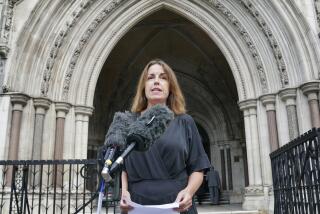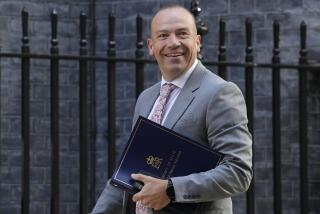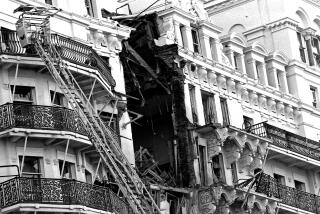Thatcher Rejects Request on IRA Killings
- Share via
LONDON — British Prime Minister Margaret Thatcher on Thursday angrily rejected an Amnesty International request to clarify events surrounding the killing of three Irish Republican Army terrorists in Gibraltar last month.
“There will be an inquest in Gibraltar, and that is the proper occasion for the matters in question to be examined,” Thatcher told Parliament.
In a letter to Thatcher, Amnesty International questioned conflicting government statements of the action and noted subsequent eyewitness evidence describing how one of the IRA guerrillas was shot several times “while lying helpless and incapacitated.”
None of the three were armed at the time they were killed, and Amnesty International has questioned whether they were shot without challenge and without an attempted capture.
The letter to Thatcher declared it “was the government’s responsibility to provide a full and public account of the circumstances surrounding this incident.”
The British government has stated that its security forces killed the three on March 6. In a statement to Parliament the following day, Foreign Secretary Geoffrey Howe indicated that the British officers had fired in the belief the IRA guerrillas were about to shoot back.
“I hope that Amnesty has some concern for the more than 2,000 people murdered by the IRA in Northern Ireland since 1969,” Thatcher said in dismissing the request.
Richard Reoch, a spokesman for the London-based Amnesty International, which monitors human rights violations globally, said its observers will attend the inquest in Gibraltar, currently not scheduled until June. But he argued that what he called “a fuller picture” is necessary, adding that a coroner’s inquest has a limited focus.
‘Conflicting Evidence’
“We’re not prejudging the issue,” he maintained. “We’re saying there is a considerable body of conflicting evidence now available. It’s Amnesty’s job as a watchdog organization, precisely on these sorts of issues worldwide, to look into them. That’s why we will be at the inquest. That’s why we’ve asked the prime minister for clarification.”
The three IRA members, 31-year-old Mairead Farrell, Danny McCann, 30, and Sean Savage, 24, were apparently trailed by Spanish and British security forces to the British colony, where it was believed they were planning to plant a car bomb near a British military parade.
They were shot as they walked toward the Spanish frontier.
A car with a bomb and timing device was subsequently found 40 miles way in the Spanish town of Marbella, and the IRA later admitted they were “on active service”--a euphemism that generally means they were plotting an attack.
The IRA has fought sporadic terrorist campaigns to end British rule in Northern Ireland ever since the six northern counties, known collectively as Ulster, were left out of a 1920 settlement that created an independent Irish Republic.
In his parliamentary statement, Howe said that if the bomb had exploded in the area, the 50 soldiers on parade and a large number of civilians might have been killed.
“Hundreds of lives were saved,” said John Carlisle, a member of Parliament from Thatcher’s Conservative Party. “Amnesty’s business should be to applaud the British government’s action and that of the (security forces) for their bravery that so much carnage was actually avoided.”
Opposition Labor members of Parliament were less dismissive of the Amnesty International request, however.
“Amnesty is asking the questions that everyone else is asking,” noted Labor’s spokesman on Northern Ireland affairs, Kevin McNamara. “. . . Why it was necessary to kill them in that way when they could have been arrested three days before the event which they were supposed to be planning.”
More to Read
Sign up for Essential California
The most important California stories and recommendations in your inbox every morning.
You may occasionally receive promotional content from the Los Angeles Times.













